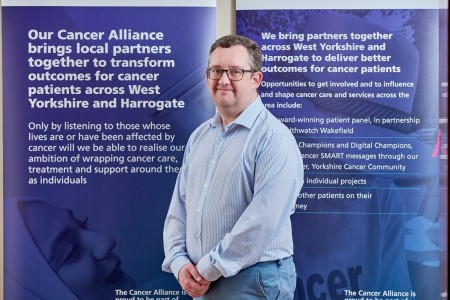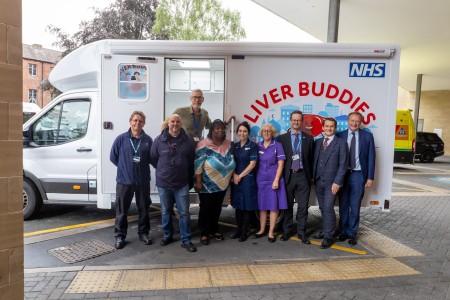Publish date: 8 September 2023
Hello, my name is Jason. I am the Managing Director for the West Yorkshire and Harrogate Cancer Alliance and NHS West Yorkshire Integrated Care Board, Associate Director for Cancer.
Next week, I will have been in the role for two years, continuing this vital agenda for the people we are here to serve.

The setting for the leadership blog for this week comes at a time of change for the Cancer Alliance, so I wanted to begin by profiling the changes into the team, recognising the achievements of those who have recently moved on and the skills and backgrounds of those who will enrich our impact as a team as new starters.
Changes in the Cancer Alliance team
This week, we have been pleased to welcome Michelle Beaumont into the position of Deputy Programme Director. Michelle joins us from her previous post as Divisional Director of Operations for Access, Booking and Choice, and Cancer, at Mid Yorkshire Teaching Hospitals NHS Trust.
Michelle has a significant working background in cancer services over many years and has previously worked with the Cancer Alliance via our Living with and Beyond Cancer Programme, which seeks to support patients with their wider, holistic, support needs at the point of initial diagnosis and as they continue their treatment. Her clinical insight, operational leadership background, and compassion to transform care for people affected by cancer in West Yorkshire and Harrogate will be a great addition to our team, supporting us to deliver our ambitions of improving the stage of diagnosis towards the goals set out in the NHS Long Term Plan.
Michelle joins us because of the retirement of Fiona Stephenson, who has been an oracle of knowledge, wisdom, and professionalism for many years, and we are hugely grateful for her support and dedication. Fiona was one of the original members of the Cancer Alliance, when our mandate was narrower and, in the early days of the Partnership, we navigated our way into the organisational shape and ethos of a Cancer Alliance from the previous organisational structures of strategic clinical networks and cancer networks respectively.
We have also welcomed Husna Munir to the Cancer Alliance, who will be supporting the activities of our workforce lead, Rachel Moser, and in particular the activities we are completing to create further sustainability and innovation within the cancer workforce. We continue with redesign activities to support non-surgical oncology transformation, alongside partnership work reviewing the functions of cancer care coordinators; navigators; the ACCEND programme; improving clinical nurse specialist workforce skill mix and sustainability; and activities linked to developing non-medical consultant roles – further linked to our ongoing clinical leadership development programme, working with Prospect.
Later this month, we will be welcoming Emma Duffy to the Cancer Alliance, who will be supporting us to respond to the national cancer planning agenda around liver cancer surveillance. As a system, we understand that it can be particularly difficult to achieve regular surveillance of patient groups who are at higher risk of liver cancer due to cirrhosis. There is some fantastic out-reach work which we are pleased to be supporting via the operational delivery network, led by Diane Williams, and this role will help us to map current service structures, referral pathways, and develop the case for a recall system for liver surveillance amongst high-risk groups. Emma will also be supporting us to increase our role and profile in the field of rarer cancers, supporting the development of additional optimal pathway groups on a regional basis, building on our established functions.
Katy Priest will also be joining us from her current posting at Yorkshire Ambulance Service. Katy will be joining us to support the work of our diagnostics lead, Lynn McNamee, and in particular the activities around enabling and ensuring best use of the community diagnostic centres for people with suspected cancer symptoms, our relationships with the diagnostic delivery networks at a regional level, and West Yorkshire Association of Acute Trusts at a system level. Further, our work involved in supporting cancer transformation where use of, and access to diagnostics, is a central feature – examples include the use of the Faecal Immunochemical Test (FIT) on the lower GI pathway.
Karen Westaway will be working with the Cancer Alliance to support the expansion of access to lynch syndrome testing across the system. Each year, 1,100 colorectal cancers are caused by Lynch syndrome, making it the most common form of hereditary colorectal cancer. An estimated 175,000 people have Lynch syndrome in the UK, but fewer than 5% of individuals know they have the condition (Bowel Cancer UK), so it is vital both to build awareness of this condition and expand access to testing, as part of our broader work on genomics.
Sarah Hodgson will be leaving the Cancer Alliance this week to pursue an expanded clinical management role, closer to home. Sarah has been a dedicated member of our Optimal Pathways team, supporting some our work to improve breast and prostate cancer pathways, through initiatives such as community breast pain clinics and nurse-led access to biopsies for prostate and access to targeted screening initiatives. Sarah has built a reputation, along with other members of the team of building good clinical relationships, mobilising work plans, and supporting the delivery of transformation. We wish her all the best for the future.
Agile and dynamic to balance local need and national priorities
These movements of people in the team underline that the work of the Cancer Alliance is dynamic, and we continue to need to be agile to the changing requirements of national planners, alongside the operational requirements of our partners locally.
Creating harmony between local need and national policy is not always an easy balancing act to achieve, and, in common with other NHS England funded and accountable programmes, we have recently received expected notice of an earlier than usual start to the planning cycle for next year. Traditionally, the process starts on Christmas Eve and completes somewhere around the Equinox, whereas this year the starting pistol will be fired in Halloween, so we hope it follows that we can have an Easter focussed on delivery – and the obligatory chocolate eggs!
As early signals and subject to usual approval processes, we are expecting continuity of cancer priorities for next year, with the expanded role and utilisation of community diagnostic centres a central feature, as systems seek to reach a position of at least four in five patients being referred on the cancer pathway being confirmed or excluded within 28 days of referral. There will be a renewed focus on cancer 62-day performance delivery and pathway focusses which reflect existing areas of Alliance activity including for lower gastrointestinal, breast, gynaecological, prostate, liver, and other cancers, such as pancreatic.
We are also anticipating heightened focus on an asymptomatic population screening programme for cancer, called GRAIL, based on the Galleri clinical trial, subject to initial results due to be published by the end of the financial year. This scheme sees people who are aged between 50 and 77 invited to provide several samples of blood over a multi-year period, which are screened for the presence of cancer DNA cells. If a positive cancer detection signal is created, this indicates a risk of around 40% for a tumour, which is aimed to be stageable at a point where an active intervention with curative intent can be offered.

New Cancer Alliance website brings our work programme to life
As a team, we have responded to our changing remit and delivery focus by refreshing our web presence, which is now an updated repository of information for clinical professionals, patients, and other members of the public with an interest in our work.

Visit the Cancer Alliance website and learn more about some of our recent achievements, including:
- The launch of Liver Buddies, a new mobile liver clinic, with partners in the Operational Delivery Network, that will save lives “on the move".
- Our ongoing public and community engagement work around the sustainable model for non-surgical oncology, building on the option developed into the Targeted Operating Model, as agreed by WYAAT.
- Our annual innovation competition, building on our pipeline of 25 currently supported schemes, has extended its reach and focus this year to create two new categories, specifically a collaboration with the voluntary, community and social enterprise sector to encourage innovation in the field of living with and beyond cancer working with the Power of Communities programme; and an expanded focus of our Patient Education Bursary. These build on the schemes established for workforce and rarer cancer innovation in the acute-sector, and opportunities for place-based teams to innovate in the fields of screening, awareness, and early diagnosis, outside of the funding allocated to Core20Plus5. Details of the schemes (and application forms) can be found online, with further details available from wyicb-wak.
wyandhcanceralliance .@nhs.net - Working with our partners to support the implementation of cancer screening awareness programmes for the LGBTQ community, particularly focusing on barriers experienced by the trans community.
- Enabling awareness and supporting the system response to the changes announced to cancer waiting times by NHS England last month.
- Development of ongoing funding for Magseed technology, an innovation that helps a surgeon locate a tumour and increases the probability of removing it completely.
Real improvements in cancer clinical outcomes
In the world of complex systems, it can be on occasion difficult to measure when a difference is being made and achieve proof of impact.
When the Integrated Care Board ambitions were set (by our Health and Care Partnership at the time), the goal for cancer was that at least 1,000 more people would have access to treatment with curative intent. Clearly, these goals were set before the Covid-19 pandemic, but our recent rapid registration dataset for cancer shows that 1,382 more people cumulatively have been diagnosed with cancer at stages 1 and 2 at the end of the last financial year, than was the case when the strategy was set.
These are real improvements in clinical outcomes of which every partner involved in their delivery, should take note and be proud, whilst recognising that we have a huge journey ahead of us to progress to the goals set out in the NHS Long Term Plan. We know that, by 2040, the population living with cancer in West Yorkshire will more than double from where it is now, and the rate of referral for urgent suspected cancer checks has already doubled over the last decade. The burden and impact of cancer remains one of the central population health challenges faced by our system and the people who face health inequalities within it.
That said, if we keep making steady progress, we will build the shape and future of interconnected and integrated cancer services that we all need – right from primary prevention to earlier diagnosis, to better and more effective treatment, and through to compassionate, personalised, end of life care. It will be crucial to maintain this interconnectivity and spirit of common collaboration across all levels, as the Cancer Alliance continues to work with its partners.
